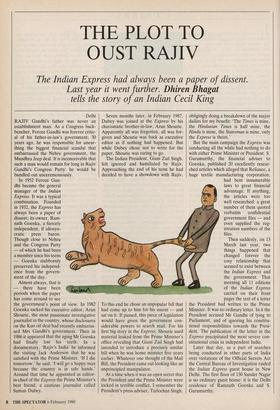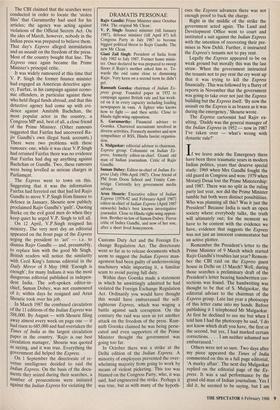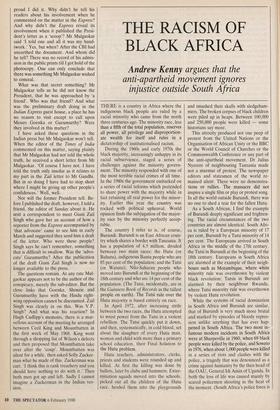THE PLOT TO OUST RAJIV
The Indian Express had always been a paper of dissent.
Last year it went further. Dhiren Bhagat
tells the story of an Indian Cecil King
Delhi RAJIV Gandhi's father was never an establishment man. As a Congress back- bencher, Feroze Gandhi was forever critic- al of his father-in-law's government; 30 years ago, he was responsible for unear- thing the biggest financial scandal that embarrassed the Nehru government, the Mundhra Jeep deal. It is inconceivable that such a man would remain for long in Rajiv Gandhi's Congress Party: he would be bundled out unceremoniously.
In 1952 Feroze Gan- dhi became the general manager of the Indian Express. It was a typical combination. Founded in 1932, the Express has always been a paper of dissent; its owner, Ram- nath Goenka, a fiercely independent, if idiosyn- cratic press baron. Though close to Nehru and the Congress Party — of which he had been a member since his teens — Goenka stubbornly preserved his independ- ence from the govern- ment of the day.
Almost always, that is — there have been periods when the paper has come around to see the government's point of view. In 1982 Goenka sacked his executive editor, Arun Shourie, the most passionate investigative journalist in the country, whose disclosures on the Kuo oil deal had recently embarras- sed Mrs Gandhi's government. Then in 1986 it appeared that the aging Mr Goenka had finally lost his teeth. In a documentary, 'Rajiv's India' he informed the visiting Jack Anderson that he was satisfied with the Prime Minister. If I die tomorrow,' he said, 'I will go a happy man because the country is in safe hands.' Around that time he appointed as editor- in-chief of the Express the Prime Minister's best friend, a cautious journalist called Suman Dubey. Seven months later, in February 1987, Dubey was joined at the Express by his charismatic brother-in-law, Arun Shourie. Apparently all was forgotten, all was for- given and Shourie was back as executive editor as if nothing had happened. But while Dubey chose not to write for the paper, Shourie was raring to go.
The Indian President, Giani Zail Singh, felt ignored and humiliated by Rajiv. Approaching the end of his term he had decided to have a showdown with Rajiv.
To this end he chose an unpopular bill that had come up to him for his assent — and sat on it. If passed, this piece of legislation would have given the government con- siderable powers to search mail. For his first big story in the Express, Shourie used material leaked from the Prime Minister's office revealing that Giani Zail Singh had intended to introduce a precisely similar bill when he was home minister five years earlier. Whatever one thought of the Mail Bill, the President came out looking like an unprincipled manipulator.
At a time when it was an open secret that the President and the Prime Minister were locked in terrible conflict, I remember the President's press adviser, Tarlochan Singh, obligingly doing a breakdown of the major dailies for my benefit: 'The Times is mine, the Hindustan Times is half mine, the Hindu is mine, the Statesman is mine, only the Express is theirs.'
But the main campaign the Express was conducting all the while had nothing to do with either Prime Minister or President. S. Gurumurthy, the financial adviser to Goenka, published 20 excellently resear- ched articles which alleged that Reliance, a huge textile manufacturing corporation, had bent innumerable laws to great financial advantage. If anything, the articles were too well researched: a great number of them quoted verbatim confidential government files — and even supplied the reg- istration numbers of the files.
Later that day, as a part of searches being conducted in other parts of India over violations of the Official Secrets Act the Central Bureau of Investigation raided the Indian Express guest house in New Delhi. The first floor of 130 Sunder Nagar is no ordinary guest house: it is the Delhi residence of Ramnath Goenka and S. Gurumurthy. The CBI claimed that the searches were conducted in order to locate the 'stolen files' that Gurumurthy had used for his articles; the agency was acting against violations of the Official Secrets Act. On the ides of March, however, nobody in the Indian press was prepared to believe them. That day's Express alleged intimidation and an assault on the freedom of the press. Most of the country bought that line. The Express once again became the Prime Minister's principal critic.
It was widely rumoured at this time that V. P. Singh the former finance minister had engaged an American detective agen- cy, Fairfax, in his campaign against econo- mic offenders, in particular against those who held illegal funds abroad, and that this detective agency had come up with evi- dence against Amitabh Bachchan, the most popular actor in the country, a Congress MP and, best of all, a close friend of the Prime Minister. (Other rumours suggested that Fairfax had uncovered Ra- jiv Gandhi's own illegal bank accounts.) There were two problems with these rumours: one, while it was clear V.P.Singh had retained Fairfax there was no evidence that Fairfax had dug up anything against Bachchan or Gandhi. Two, these rumours were being levelled as serious charges in Parliament.
The Express went to town on this. Suggesting that it was the information Fairfax had ferreted out that from led Rajiv Gandhi to move V.P.Singh from finance to defence in January, Shourie now publicly proclaimed Rajiv Gandhi's 'guilt'. Quoting Burke on the evil good men do when they keep quiet he urged V.P. Singh to tell all. On 12 April, V.P.Singh resigned his ministry. The very next day an editorial appeared on the front page of the Express urging the president to 'act' — i.e. to dismiss Rajiv Gandhi — and, presumably, to replace him with the good Mr Singh. British readers will notice the similarity with Cecil King's famous editorial in the Daily Mirror of 8 May 1968 'Enough is enough'; for many Indians it was the most dangerous editorial published in indepen- dent India. The soft-spoken editor-in- chief, Suman Dobey, was not enamoured of it; within days he resigned and Arun Shourie took over his job.
In March 1987 the combined circulation of the 11 editions of the Indian Express was 588,000. By August — with Shourie filing away almost every week on page one — it had risen to 685,000 and had overtaken the Times of India as the largest circulation paper in the country. 'Rajiv is our best circulation manager,' Shourie was quoted as saying, and it was true. Everything the government did helped the Express.
On 1 September the directorate of re- venue intelligence decided to raid the Indian Express. On the basis of the docu- ments they seized during their searches, a number of prosecutions were initiated against the Indian Express for violating the Customs Duty Act and the Foreign Ex- change Regulation Act. The directorate went so far as to release documents which seem to suggest the Indian Express man- agement had been guilty of underinvoicing machinery while importing it, a familiar scam to avoid paying full duty.
Within days Goenka made a statement in which he unwittingly admitted he had violated the Foreign Exchange Regulation Act. Ordinarily you would have thought this would have embarrassed the self- righteous Express, which was waging a battle against such corruption. On the contrary the raid was seen as yet another attack on the freedom of the press. Ram- nath Goenka claimed he was being perse- cuted and even supporters of the Prime Minister thought the government was going too far. In October there was a strike at the Delhi edition of the Indian Express. A minority of employees prevented the over- whelming majority from going to work by means of violent picketing. This too was blamed on the Congress Party, who, it was said, had engineered the strike. Perhaps it was true, but as with many of the hypoth- eses the Express advances there was not enough proof to back the charge.
Right in the middle of the strike the government acted again. The Land and Development Office went to court and instituted a suit against the Indian Express with the intention of recovering their pre- mises in New Dehli. Further, it instructed the Express's tenants not to pay rent.
Legally the Express appeared to be on weak ground but morally this was the last straw. When the government instructed the tenants not to pay rent the cry went up that it was trying to kill the Express financially. This was followed by a flurry of reports in November that the government was going to take over not just the Express building but the Express itself. 'By now the assault on the Express is as brazen as it was during the emergency,' Shourie wrote .
The Express cartoonist had Rajiv ex- ulting. 'Daddy was the general manager of the Indian Express in 1952 — now in 1987 I've taken over — what's wrong with dynastic rule?'
If we leave aside the Emergency there have been three traumatic years in modern Indian politics, years that deserve special study: 1969 when Mrs Gandhi fought the old guard in Congress and won: 1979 when Morarji Desai lost the Prime Ministership: and 1987. There was no split in the ruling party last year, nor did the Prime Minister tumble but both were distinct possibilities. Who was planning all this? Was it just the President? Because India is such an open society where everybody talks, the truth will ultimately out; for the moment we have to be content with the evidence we have, evidence that suggests the Express was not just an innocent commentator but an active plotter.
Remember the President's letter to the Prime Minister of 9 March which started Rajiv Gandhi's troubles last year? Remem- ber the CBI raid on the Express guest house in Delhi on 13 March? Well, during those searches a preliminary draft of the President's letter bearing handwritten cor- rections was found. The handwriting was thought to be that of S. Mulgaokar, the editorial adviser to the chairman of the Express group. Late last year a photocopy of this letter came into my hands. Before publishing it I telephoned Mr Mulgaokar. At first he declined to see me but when I told him I had the photocopy he said, 'I do not know which draft you have, the first or the second, but yes, I had marked certain corrections. . . . I am neither ashamed nor embarrassed.'
Others were not so sure. Two days after my piece appeared the Times of India commented on this in a full page editorial, `A murky affair'. The next day Mulgaokar replied on the editorial page of the Ex- press. It was a sad performance by the grand old man of Indian journalism. Yes I did it, he seemed to be saying, but I am proud I did it. Why didn't he tell his readers about his involvement when he commented on the matter in the Express? And why didn't the Express reveal its involvement when it published the Presi- dent's letter as a 'scoop'? Mr Mulgaokar said 'I told one and all it was my hand- iwork.' Yes, but when? After the CBI had unearthed the document. And whom did he tell? There was no record of his admis- sion in the public prints till I got hold of the photocopy. One can only conclude that there was something Mr Mulgaokar wished to conceal.
What was that secret something? Mr Mulgaokar tells us he did not know the President, that he was approached by 'a friend'. Who was that friend? And what was the preliminary draft doing in the Indian Express guest house, a place he has no reason to visit except to call upon Messrs Goenka or Gurumurthy? Were they involved in this matter?
I have asked these questions in the Indian press but Mr Mulgaokar won't tell. When the editor of the Times of India commented on this matter, saying plainly that Mr Mulgaokar had not told the whole truth, he received a short letter from Mr Mulgaokar. 'Of course I have not. I have told the truth only insofar as it relates to my part in the Zail letter to Mr Gandhi. But in so doing I have had to stop short where I might be giving up other people's confidences.' Well, well.
Nor will the former President tell. Be- fore I published the draft, however, I told a friend, the editor of Sunday about it. He sent a correspondent to meet Giani Zail Singh who gave her an account of how a reporter from the Express accompanied by `that advocate' came to see him in early March and suggested they send him a draft of the letter. Who were these people? Singh says he can't remember, something that is difficult to swallow. Was the 'advo- cate' Gurumurthy? After the publication of the draft Giani Zail Singh is now no longer available to the press.
The questions remain. At any rate Mul- gaokar appears not to be the author of the conspiracy, merely the sub-editor. But the close links that Goenka, Shourie and Gurumurthy have with the Hindu right- wing opposition cannot be discounted. Zail Singh was clearly in on this. Was V.P. Singh? And what was his reaction? In Hugh Cudlipp's memoirs, there is a mar- vellous account of the meeting he arranged between Cecil King and Mountbatten in the first week of May 1968. King went through a shopping list of Wilson's defects and then proposed that Mountbatten take over after the 'coup'. Mountbatten was silent for a while, then asked Solly Zucker- man what he made of this. Zuckerman was curt. 'I think this is rank treachery and you should have nothing to do with it.' Then both men got up and left. Sadly I cannot imagine a Zuckerman in the Indian ver- sion.




















































 Previous page
Previous page